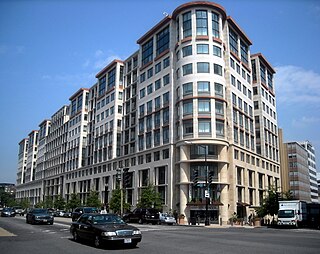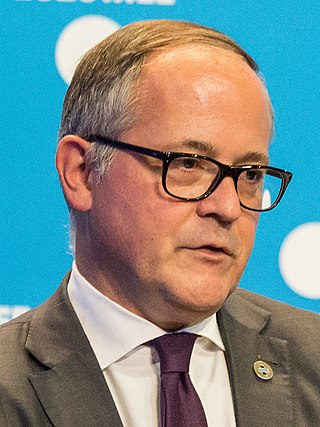
The International Finance Corporation (IFC) is an international financial institution that offers investment, advisory, and asset-management services to encourage private-sector development in less developed countries. The IFC is a member of the World Bank Group and is headquartered in Washington, D.C. in the United States.
Credit risk is the possibility of losing a lender holds due to a risk of default on a debt that may arise from a borrower failing to make required payments. In the first resort, the risk is that of the lender and includes lost principal and interest, disruption to cash flows, and increased collection costs. The loss may be complete or partial. In an efficient market, higher levels of credit risk will be associated with higher borrowing costs. Because of this, measures of borrowing costs such as yield spreads can be used to infer credit risk levels based on assessments by market participants.

Financial services are economic services provided by the finance industry, which together encompass a broad range of service sector firms that provide financial management, including credit unions, banks, credit-card companies, insurance companies, accountancy companies, consumer-finance companies, stock brokerages, investment funds, individual asset managers, and some government-sponsored enterprises.

The Ministry of Finance of the People's Republic of China is the cabinet-level executive department of the State Council of China which administers macroeconomic policies and the annual budget. It also handles fiscal policy, economic regulations and government expenditure for the state.
A financial intermediary is an institution or individual that serves as a middleman among diverse parties in order to facilitate financial transactions. Common types include commercial banks, investment banks, stockbrokers, pooled investment funds, and stock exchanges. Financial intermediaries reallocate otherwise uninvested capital to productive enterprises through a variety of debt, equity, or hybrid stakeholding structures.

China Development Bank is a development bank in the People's Republic of China, led by a governor-level cabinet minister, under the direct jurisdiction of the State Council. As one of three policy banks in China, it is responsible for raising funds for large-scale infrastructure projects, including the Three Gorges Dam and the Shanghai Pudong International Airport. Established by the Policy Banks Law of 1994, the bank is described as the engine that powers the national government's economic development policies.

The Intergovernmental Group of Twenty-Four on International Monetary Affairs and Development, or The Group of 24 (G-24) was established in 1971 as a chapter of the Group of 77 in order to help coordinate the positions of developing countries on international monetary and development finance issues, as well as and to ensure that their interests are adequately represented in negotiations on international monetary matters. Though originally named after the number of founding Member States, it now has 28 Members. Although the G-24 officially has 28 member countries, any member of the G-77 can join discussions.

William Reginald "Bill" Rhodes is an American banker and philanthropist. Rhodes is president and CEO of William R. Rhodes Global Advisors, LLC which he founded in 2010. Having stepped back from full-time responsibilities with Citi after more than 53 years with the institution. He most recently served as senior advisor, senior vice chairman and senior international officer of Citigroup and chairman, president & CEO of Citibank, N.A. He held various senior executive positions at Citi from 1957 until his retirement from Citigroup on April 30, 2010. Subsequent to his retirement, he continued to serve as a senior advisor to Citi from 2010 through 2017.

Axel Alfred Weber is a German economist, professor, and banker. He is currently a board member and chairman of Swiss investment bank and financial services company, UBS Group AG, and has announced his resignation effective 7 April 2022.

A financial centre or financial hub is a location with a significant concentration of participants in banking, asset management, insurance, and financial markets, with venues and supporting services for these activities to take place. Participants can include financial intermediaries, institutional investors, and issuers. Trading activity can take place on venues such as exchanges and involve clearing houses, although many transactions take place over-the-counter (OTC), directly between participants. Financial centres usually host companies that offer a wide range of financial services, for example relating to mergers and acquisitions, public offerings, or corporate actions; or which participate in other areas of finance, such as private equity, hedge funds, and reinsurance. Ancillary financial services include rating agencies, as well as provision of related professional services, particularly legal advice and accounting services.

The Ministry of Finance of Chile is the cabinet-level administrative office in charge of managing the financial affairs, fiscal policy, and capital markets of Chile; planning, directing, coordinating, executing, controlling and informing all financial policies formulated by the President of Chile.
The shadow banking system is a term for the collection of non-bank financial intermediaries (NBFIs) that provide services similar to traditional commercial banks but outside normal banking regulations. Examples of NBFIs include hedge funds, insurance firms, pawn shops, cashier's check issuers, check cashing locations, payday lending, currency exchanges, and microloan organizations. The phrase "shadow banking" is regarded by some as pejorative, and the term "market-based finance" has been proposed as an alternative.
A non-banking financial institution (NBFI) or non-bank financial company (NBFC) is a financial institution that is not legally a bank; it does not have a full banking license or is not supervised by a national or international banking regulatory agency. NBFC facilitate bank-related financial services, such as investment, risk pooling, contractual savings, and market brokering. Examples of these include insurance firms, pawn shops, cashier's check issuers, check cashing locations, payday lending, currency exchanges, and microloan organizations. Alan Greenspan has identified the role of NBFIs in strengthening an economy, as they provide "multiple alternatives to transform an economy's savings into capital investment which act as backup facilities should the primary form of intermediation fail."

Ana Patricia Botín-Sanz de Sautuola O'Shea DBE is a Spanish banker who has served as the executive chairman of Santander Group since 2014. She is the fourth generation of the Botín family to hold this role. Prior to this she was chief executive officer (CEO) of Santander UK, a role she held from December 2010 until her assumption of the chairmanship.

The Financial Supervisory Service (FSS) is South Korea's integrated financial regulator that examines and supervises financial institutions under the broad oversight of the Financial Services Commission (FSC), the government regulatory authority staffed by civil servants.

Benoît Georges Cœuré is a French economist who has been serving as President of the Autorité de la concurence since 2022. He previously served as a member of the Executive Board of the European Central Bank from 2012 to 2019.
Charles H. Dallara is an American banker and the former managing director of the Institute of International Finance.

Hassan Abdallah is an Egyptian financier. He is the current governor of the Central Bank of Egypt. He previously held the chief executive officer position of the Arab African International Bank (AAIB), a regional financial services institution that was Egypt's first Arab multinational bank and was established by a special law as a joint venture between the Central Bank of Egypt (CBE) and the Kuwait Investment Authority (KIA). Abdalla joined the AAIB in 1982 and, by 2002, had become CEO. In parallel to his executive mandate, Abdalla has also been an adjunct finance professor at the American University in Cairo (AUC) for the past 18 years. In August 2022, Hassan Abdallah was appointed as the new acting governor of the Central Bank of Egypt (CBE) by presidential decree.

Greylock Capital Management, LLC is a U.S. Securities and Exchange Commission registered alternative investment adviser that invests in undervalued, distressed, and high yield assets worldwide, particularly in emerging and frontier markets. As is the case with comparable funds, the firm's investor base consists largely of institutional investors and a limited number of high net worth individuals. As a group, institutional investors may include banks, credit unions, insurance companies, pension funds, hedge funds, REITs, endowments and mutual funds. As is common with many asset management firms, Greylock Capital is organized across a series of onshore and offshore limited partnerships.

The Julis-Rabinowitz Center for Public Policy and Finance (JRC) is a leading research center at the Princeton School of Public and International Affairs (SPIA) of Princeton University. Founded in 2011, the JRC primarily promotes research on public policy as it relates to financial markets and macroeconomics. The center has also expanded its research and teaching to multiple disciplines, including economics, operations research, political science, history, and ethics.















